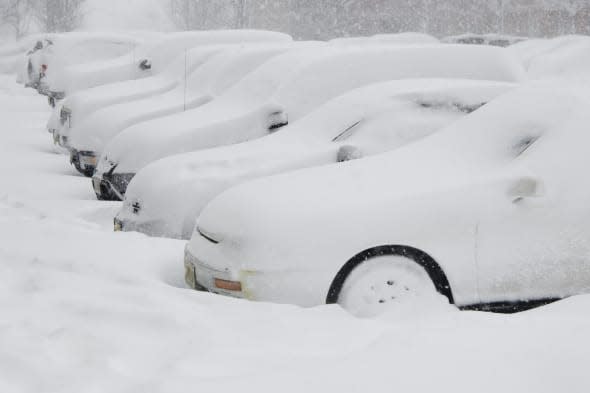Winter storms: what to do if you can't get into work

As storms swept across the UK over the weekend, bringing extreme weather including thundersnow and mini-tornadoes, many of us battened down the hatches and refused to leave the house.
Temperatures have plummeted to as low as -11°C in parts of Scotland, and there are extreme weather warnings in many parts of the country - some of which are expected to stay in place for at least the next four days. Roads are icy, and many trains are being delayed by snow.
But while it's usually easy enough to cancel your plans and wrap up warm over the weekend, that's not the case when Monday morning dawns. So what do you do when the weather makes it difficult or impossible to get into work? And what are your rights?
What if I can't get in?
Maybe your car's buried under three feet of snow; maybe bus or rail services have shut down. Either way, there's no way you can make it into work without a sled and a team of huskies.
Technically, this is your problem, as you're obliged to turn up for work unless you're sick, on holiday or on maternity leave. However, your employer can't pressure you into risking your safety to get into the office - and no reasonable boss would do so.
However, if you're regularly using the weather as an excuse to miss work and your employer thinks you're being unreasonable, you should be prepared for the possibility of disciplinary action.
Does my employer have to pay me?
Whether or not you're entitled to be paid for a 'snow day' depends on what's in your contract. Most contain an explicit bad weather policy, usually stipulating that employees will be paid as long as they've made a reasonable effort to get in.
Sometimes, a contract stipulates that workers should make up the time later or take it as unpaid holiday. Employers can also require you to take paid annual leave in periods of bad weather, but only if they give you at least two days' notice.
If there's no specific policy, check what's happened in the past: if staff have normally been paid in such situations, you'll have a very good case if your boss tries to penalise you.
Can my employer make me work from home?
Now that most people have a PC at home, many people can work from home almost as easily as from the office. And, with or without a specific policy, your employer can require you to do this if you can't make it in because of bad weather. They can also ask you to work from another office.
What if my employer closes for the day?
If your employer decides to close the office, you're entitled to be paid and don't have to take the time as annual leave. Sometimes, a contract will contain an 'unpaid layoff' clause, but this is rare - and you'll still be entitled to a small amount of layoff pay. You can, though, be required to work from home, or from another office, if this is possible - so don't start building that snowman just yet.
Can my employer make me do something dangerous?
Your employer can't make you take a journey that's dangerous, so don't feel pressured to come in to work if it doesn't feel safe to do so.
And, once you get to work, your employer is responsible for making sure your workplace is safe. This may mean gritting, clearing snow or temporarily closing off particular areas such as external stairs. If you do slip and hurt yourself and then bring a claim, the court will look at whether your employer made a reasonable effort stop it happening.
Is there a minimum temperature for work?
There's no minimum temperature as such, but legislation does require it to be 'reasonable'. What this means in practice will depend on the job.
The Health and Safety Executive recommends a minimum temperature of 16°C for workplaces where staff are fairly inactive, such as in an office. For workplaces where the majority of the work requires physical effort, there's a recommended minimum temperature of 13°C.
What if my child's school is closed?
This is a particularly difficult problem for many parents, who may get little or no warning of a school closure. Staff are entitled to unpaid time off to make arrangements for dependants (and this can include adults as well as children if, say, an old person's daycare facility is closed).
Technically, this time off is for parents to make arrangements for childcare, rather than simply looking after their kids themselves - but it would be a very unreasonable employer that would stick to the letter of the law. How much time you're entitled to will depend on the circumstances; as usual, the employer's expected to be reasonable.
Read more on AOL Money:
The worst excuses for calling in sick
Zero hours contracts - what you need to know
What perks can you get from your boss?





